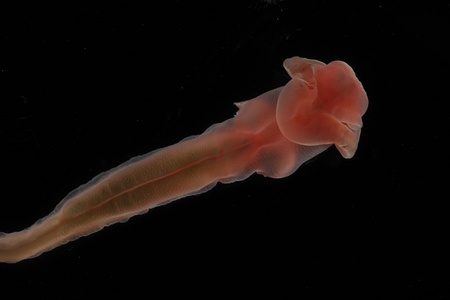Strange deep sea creatures discovered by Aberdeen researchers have been confirmed as three new species previously unknown to science.
DNA analysis has established that creatures captured by scientists from the University of Aberdeen’s Oceanlab during a voyage to the Mid Atlantic Ocean are members of the Torquaratoridae; a recently discovered family of acorn worms.
The identification of the delicate creatures – which could not be collected using the primitive deep sea grabs and dredges of previous centuries – may provide new insight not only into life in the deep sea but the evolution of life on earth.
The Torquaratoridae, which were captured last year using a remotely operated vehicle launched from the RRS James Cook , have no eyes and no tail but manage to crawl along the sea floor harvesting food that has fallen from the surface.
Professor Monty Priede, Director of the University of Aberdeen’s Oceanlab and leader of the expedition that retrieved the samples from the Atlantic Ocean, said:
“Acorn worms are known as a scientific curiosity, inconspicuous burrowing animals that are related to the ancestors of back boned animals.
“They are perceived as an evolutionary dead end, having been surpassed by their cousins, the fishes which acquired tails became fast swimmers, conquered the oceans and gave rise to reptiles, mammals and birds.
“However the Torquaratoridae family of acorn worms has not stood still; on the contrary they crawl over the sea floor, ploughing nutritious sediment into the mouth and leaving a characteristic spiral trail behind. They have also been observed to make swimming movements lifting off the sea floor to drift on the currents between patches of suitable feeding territory.”
Professor Priede added that expeditions to the deep sea, using remotely operated vehicles, were likely to lead to ‘an evolutionary explosion’ of these animals with 15 species discovered so far and many more likely to be found in coming years.
“At depths between 1500 and 3700m the deep sea acorn worms can be amongst the most abundant mobile animals alongside, sea cumbers, star fishes, crustaceans, molluscs and fishes that inhabit the deep sea,” he said.
“The DNA analysis has shown the relationships of the three Atlantic specimens to the growing family tree of the Torquaratoridae. The way is now clear to correctly describe and name these new species, which at present are just know by their colours, pink, purple and white.
“This is another exciting find for the Oceanlab team and it is strange to think that when I began my career as a zoologist I thought all the great discoveries had been made in the 1800s at the time of Charles Darwin.
“Now new technology and remotely operated vehicles are allowing us to reach new depths and capture new creatures. Oceanlab is at the forefront of this new technology and finds like this demonstrate that the age of discovery is far from over.”
A paper detailing the identification of the three new species is published today (November 16) in Proceedings of the Royal Society Series B.
The DNA analysis was conducted by Dr Karen Osborn, senior author of the paper, from the Department of Invertebrate Zoology, Smithsonian Institution, National Museum of Natural History, Washington.


